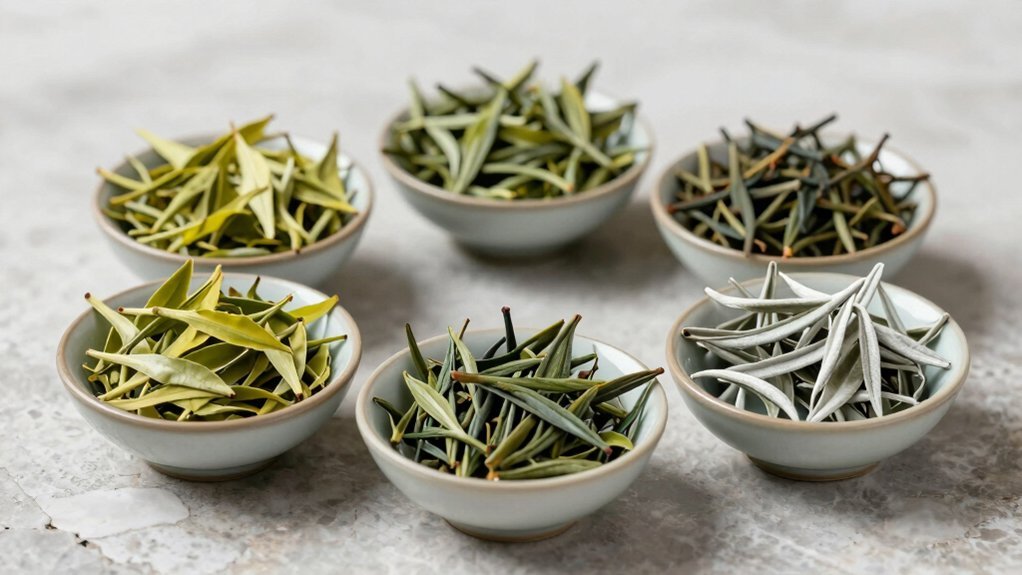Raspberry leaf tea offers numerous benefits for women's health. It can ease menstrual cramps, boost fertility, and support pregnancy by improving uterine tone. During labor, it may enhance delivery and reduce complications. The tea increases iron absorption, promoting overall health and energy levels. Postpartum, it aids in recovery and supports breastfeeding. For menopausal women, it alleviates symptoms like hot flashes and night sweats. Its immune-boosting properties help keep you healthy year-round. With its ability to balance hormones and provide essential nutrients, raspberry leaf tea is a natural ally for women at various life stages. Discover how this powerful herbal remedy can transform your well-being.
Key Takeaways
- Eases menstrual cramps and regulates menstrual flow through its muscle-toning and astringent properties.
- Supports fertility by strengthening uterine walls, balancing hormones, and regulating menstrual cycles.
- Aids pregnancy health by potentially reducing labor complications and shortening delivery time.
- Promotes postpartum recovery by assisting in uterine toning and supporting milk production for breastfeeding.
- Alleviates menopausal symptoms such as hot flashes, night sweats, and mood swings.
Eases Menstrual Cramps

Relief from menstrual discomfort is one of the most celebrated benefits of raspberry leaf tea. If you're struggling with painful cramps during your period, this herbal remedy might be worth trying.
Raspberry leaf tea contains fragarine, a compound that helps tone and tighten muscles in the pelvic area, potentially reducing the intensity of menstrual cramps. The tea's natural astringent properties can also help decrease heavy menstrual flow, which may contribute to less severe cramping.
By drinking raspberry leaf tea regularly, you may experience a gradual reduction in period pain over time. Many women report feeling relief within a few menstrual cycles of consistent use.
To maximize its effectiveness, start drinking the tea a few days before your period is due to begin. Aim for 1-3 cups daily, gradually increasing your intake as your body adjusts.
Boosts Fertility

Raspberry leaf tea has gained attention for its potential to enhance fertility in women. This herbal remedy contains a variety of nutrients and compounds that may support reproductive health and increase your chances of conception.
One of the key ways raspberry leaf tea can boost fertility is by strengthening the uterine walls. The tea's high mineral content, particularly iron and calcium, helps tone the uterus and improve its overall function. This can create a more hospitable environment for implantation and fetal development.
Additionally, raspberry leaf tea may help regulate menstrual cycles, making it easier to predict ovulation and plan for conception. It's also believed to balance hormones, which is essential for maintaining a healthy reproductive system.
The tea's antioxidant properties can protect your reproductive organs from oxidative stress and inflammation, potentially improving egg quality. Some women report increased cervical mucus production when drinking raspberry leaf tea, which can aid sperm motility and survival.
While more research is needed to fully understand its effects, many women incorporate raspberry leaf tea into their fertility-boosting regimen.
As with any supplement, it's important to consult your healthcare provider before adding it to your routine, especially if you're actively trying to conceive.
Supports Pregnancy Health

During pregnancy, you'll find raspberry leaf tea to be a valuable ally.
It's known to strengthen your uterine muscles, potentially reducing labor complications and shortening delivery time.
Additionally, this herbal brew may help ease morning sickness, making your pregnancy journey more comfortable.
Strengthens Uterine Muscles
Expectant mothers often seek natural ways to support their pregnancy journey. Raspberry leaf tea can be a valuable addition to your prenatal routine, particularly for strengthening uterine muscles. This herbal tea contains fragarine, a compound that helps tone and tighten pelvic muscles, including the uterus.
By regularly consuming raspberry leaf tea, you're potentially improving the effectiveness of your contractions during labor. Stronger uterine muscles can lead to a more efficient birthing process, potentially reducing the duration of labor and the need for interventions.
It's crucial to understand that while the tea doesn't induce labor, it prepares your body for the intense work ahead. Start with small amounts in your second trimester, gradually increasing intake as you approach your due date. This allows your body to acclimate to the tea's effects.
Always consult your healthcare provider before adding raspberry leaf tea to your pregnancy regimen, as individual circumstances may vary. Remember, the goal is to support your body's natural processes, not to force them.
Reduces Labor Complications
Beyond strengthening uterine muscles, raspberry leaf tea offers additional benefits for expectant mothers, particularly in reducing labor complications. Studies suggest that drinking this herbal tea during pregnancy may lead to shorter labor times and fewer interventions during delivery.
You'll be pleased to know that raspberry leaf tea can decrease the likelihood of preterm labor, postpartum hemorrhage, and the need for artificial rupture of membranes. It's also been associated with a reduced risk of cesarean sections and forceps deliveries. The tea's high mineral content, including iron, calcium, and magnesium, supports overall pregnancy health and may contribute to these positive outcomes.
Regular consumption of raspberry leaf tea in the third trimester can help tone and prepare your uterus for labor. This preparation may result in more efficient contractions and a smoother delivery process. While it's not a guarantee, many women report experiencing easier labors after incorporating this tea into their prenatal routine.
As with any herbal supplement during pregnancy, it's essential to consult your healthcare provider before adding raspberry leaf tea to your diet. They can advise on the appropriate dosage and timing based on your individual health needs and pregnancy progression.
Eases Morning Sickness
Relief from morning sickness is a welcome benefit of raspberry leaf tea for many pregnant women. If you're struggling with nausea and vomiting during pregnancy, this herbal remedy might offer some respite. Raspberry leaf tea contains vitamins and minerals that can help settle your stomach and reduce the frequency of morning sickness episodes.
The tea's natural compounds work to soothe your digestive system and alleviate nausea. It's abundant in magnesium, which can help relax muscles and reduce stomach discomfort. You'll also find potassium in raspberry leaf tea, which aids in maintaining proper fluid balance and may help combat dehydration caused by frequent vomiting.
Here's a quick overview of raspberry leaf tea's benefits for morning sickness:
| Benefit | How It Helps | When to Drink |
|---|---|---|
| Nausea Relief | Soothes stomach | Morning or evening |
| Hydration | Replenishes fluids | Throughout the day |
| Nutrient Boost | Provides vital vitamins | With meals |
While raspberry leaf tea can be effective, it's important to consult your healthcare provider before adding it to your pregnancy routine. They can advise on the appropriate dosage and guarantee it's safe for your specific situation. Remember, every pregnancy is unique, and what works for one woman may not work for another.
Improves Uterine Tone

Strength and resilience are key attributes of a healthy uterus, and raspberry leaf tea can help promote both. This herbal remedy has been used for centuries to support uterine health and improve its overall tone. When you drink raspberry leaf tea regularly, you're introducing fragarine, a compound that helps strengthen the pelvic and uterine muscles.
By improving uterine tone, you're potentially reducing the risk of complications during pregnancy and childbirth. A toned uterus is more efficient in contracting and relaxing, which can lead to easier labor and delivery. It's also believed to help minimize postpartum bleeding and support faster recovery after childbirth.
You don't have to be pregnant to benefit from raspberry leaf tea's uterine-toning properties. Regular consumption may help alleviate menstrual cramps and regulate menstrual flow. It can also support overall reproductive health by promoting hormonal balance and strengthening the uterine walls.
If you're trying to conceive, a well-toned uterus provides a more hospitable environment for implantation. Remember to consult your healthcare provider before incorporating raspberry leaf tea into your routine, especially if you're pregnant or have any underlying health conditions.
Enhances Labor and Delivery

Raspberry leaf tea's uterine toning effects can greatly benefit you during labor and delivery.
You might experience a reduction in labor duration due to the tea's potential to increase the efficiency of contractions.
Additionally, this herbal remedy may serve as a natural pain management aid, potentially easing discomfort during childbirth.
Uterine Toning Effects
Expectant mothers have long turned to raspberry leaf tea for its potential uterine toning effects. This herbal remedy is believed to strengthen and tone the uterine muscles, preparing them for the demanding task of labor and delivery. The tea's active compounds, including fragarine, may help improve the uterus's ability to contract effectively during childbirth.
By consuming raspberry leaf tea regularly in the later stages of pregnancy, you're potentially enhancing your uterine muscle tone. This improved muscle strength could lead to more efficient contractions during labor, potentially reducing the duration and intensity of your delivery.
Additionally, a toned uterus may recover more quickly postpartum, helping you bounce back faster after giving birth.
It's important to note that while many women report positive experiences, scientific evidence is still limited. Always consult your healthcare provider before incorporating raspberry leaf tea into your pregnancy regimen.
They can advise on the appropriate timing and dosage based on your individual health circumstances. Remember, every pregnancy is unique, and what works for one woman may not be suitable for another.
Potential Labor Duration Reduction
Building on the uterine toning effects, many women turn to raspberry leaf tea in hopes of reducing their labor duration. While research is limited, some studies suggest that regularly consuming raspberry leaf tea during pregnancy may lead to shorter labor times. A 2001 study found that women who drank raspberry leaf tea were less likely to need artificial rupture of membranes, cesarean section, or forceps delivery.
You might experience a reduction in the length of your labor's second stage, which involves pushing and delivery. This potential benefit is attributed to the tea's ability to strengthen and tone the uterine muscles, potentially making contractions more effective.
However, it's essential to acknowledge that individual results can vary, and not all women will experience a notable shorter labor.
If you're considering using raspberry leaf tea to potentially reduce your labor duration, it's vital to consult your healthcare provider first. They can advise you on when to start drinking the tea and the appropriate dosage based on your individual circumstances.
Natural Pain Management Aid
While managing pain during labor can be challenging, many women turn to raspberry leaf tea as a natural aid. This herbal remedy has been used for centuries to support women during childbirth.
Raspberry leaf tea contains fragarine, a compound that may help tone the uterine muscles, potentially leading to more effective contractions and less discomfort during labor.
You might find that regular consumption of raspberry leaf tea in the weeks leading up to your due date can help prepare your body for the birthing process. Some women report experiencing less pain and a reduced need for medical interventions during labor when they've incorporated this tea into their prenatal routine.
Here are some potential benefits of raspberry leaf tea for pain management during labor:
- May increase uterine muscle tone, leading to more efficient contractions
- Could reduce the intensity of labor pains
- Might decrease the likelihood of needing pain medication
- May help maintain focus and calm during contractions
Remember to consult with your healthcare provider before adding raspberry leaf tea to your prenatal regimen, as individual circumstances may vary.
While many women find it helpful, it's important to verify it's safe for your specific situation.
Balances Hormones Naturally

Raspberry leaf tea offers a natural way to balance hormones in women. This herbal remedy contains compounds that can help regulate estrogen and progesterone levels, which are vital for maintaining a healthy menstrual cycle and overall reproductive health.
By drinking raspberry leaf tea regularly, you may experience more balanced moods, reduced PMS symptoms, and improved menstrual regularity.
The tea's high mineral content, including iron, calcium, and magnesium, supports hormone production and function. These nutrients work together to nourish your endocrine system, which is responsible for hormone regulation.
Additionally, raspberry leaf tea contains fragarine, a compound that can help tone and strengthen the uterus, potentially easing menstrual cramps and promoting hormonal balance.
You'll find that this tea may also help with fertility and pregnancy-related hormonal changes. It's known to support healthy implantation and can ease morning sickness in early pregnancy.
However, it's important to consult your healthcare provider before using raspberry leaf tea during pregnancy or if you have any underlying health conditions.
Increases Iron Absorption

Raspberry leaf tea can be a powerful ally in your fight against iron deficiency anemia.
You'll benefit from its ability to enhance mineral uptake efficiency, making it easier for your body to absorb iron from both the tea and other foods you consume.
Combats Iron Deficiency Anemia
For women struggling with iron deficiency anemia, raspberry leaf tea offers a natural solution. This herbal tea not only contains iron but also enhances your body's ability to absorb this essential mineral.
By drinking raspberry leaf tea regularly, you're giving your body a boost in combating anemia symptoms like fatigue, weakness, and shortness of breath.
The tea's high vitamin C content further aids iron absorption, making it an excellent choice for women with low iron levels. It's particularly beneficial during pregnancy, when iron needs increase considerably.
By incorporating raspberry leaf tea into your diet, you're supporting your body's red blood cell production and oxygen-carrying capacity.
Here's how raspberry leaf tea can help you fight iron deficiency anemia:
- Provides a natural source of easily absorbable iron
- Enhances iron absorption from other foods
- Reduces symptoms of anemia, such as fatigue and dizziness
- Supports overall blood health and oxygen circulation
Enhances Mineral Uptake Efficiency
An often overlooked benefit of raspberry leaf tea is its ability to enhance mineral uptake efficiency. This herbal tea contains compounds that can greatly improve your body's absorption of essential minerals, particularly iron. When you drink raspberry leaf tea alongside iron-rich foods or supplements, you're giving your body a better chance to utilize these nutrients effectively.
The secret lies in the tea's high vitamin C content. Vitamin C is known to enhance iron absorption, especially from plant-based sources. By pairing raspberry leaf tea with your meals, you're creating an ideal environment for peak iron uptake. This is especially beneficial if you're following a vegetarian or vegan diet, where iron absorption can be more challenging.
Additionally, raspberry leaf tea contains other minerals like calcium, magnesium, and potassium. The presence of these minerals in a bioavailable form can further support your body's overall mineral balance.
Supports Healthy Hemoglobin Levels
Building on its ability to enhance mineral uptake, raspberry leaf tea plays an important role in supporting healthy hemoglobin levels. This herbal infusion is particularly beneficial for women, as it can help increase iron absorption in the body.
Iron is vital for the production of hemoglobin, the protein in red blood cells responsible for carrying oxygen throughout your system. When you drink raspberry leaf tea regularly, you're giving your body a natural boost in iron absorption.
This can be especially helpful if you're prone to anemia or experience heavy menstrual periods. The tea's high vitamin C content further enhances iron absorption, making it an excellent choice for maintaining ideal hemoglobin levels.
Here's how raspberry leaf tea supports healthy hemoglobin levels:
- Improves iron absorption from both plant and animal sources
- Contains easily assimilable iron in its natural form
- Provides vitamin C, which aids in iron absorption
- Helps prevent iron deficiency anemia
Promotes Postpartum Recovery

Recovery after childbirth can be a challenging journey for many women. Raspberry leaf tea can be a natural ally in promoting postpartum recovery. It's known to help your body heal and regain strength after giving birth.
This herbal tea can assist in toning your uterus, reducing postpartum bleeding, and balancing hormones. It's rich in vitamins and minerals that support overall health during this vital time. You'll find that regular consumption may help with milk production if you're breastfeeding.
Here's a quick guide to incorporating raspberry leaf tea into your postpartum routine:
| Week | Cups per Day | Benefits |
|---|---|---|
| 1-2 | 1-2 | Gentle healing |
| 3-4 | 2-3 | Increased energy |
| 5-6 | 3-4 | Hormone balance |
| 7-8 | 4-5 | Uterine toning |
| 9+ | As needed | Maintenance |
Remember to consult your healthcare provider before adding raspberry leaf tea to your postpartum care plan. While it's generally safe, individual needs may vary. By incorporating this natural remedy, you're taking a proactive step in supporting your body's recovery process after childbirth.
Alleviates Menopausal Symptoms

Raspberry leaf tea's benefits extend beyond postpartum care to support women through another significant life stage: menopause. As you navigate this phase, you'll find that this herbal remedy can help alleviate many common menopausal symptoms.
The tea's high mineral content, including calcium and iron, supports bone health and helps prevent osteoporosis, a concern for many menopausal women.
Raspberry leaf tea's natural compounds can help balance hormones, reducing the frequency and intensity of hot flashes and night sweats. You'll also appreciate its mild sedative properties, which can improve sleep quality and reduce mood swings often associated with menopause.
The tea's astringent qualities may help alleviate vaginal dryness, a common discomfort during this time.
Here are some key benefits of raspberry leaf tea for menopausal women:
- Reduces hot flashes and night sweats
- Supports bone health
- Improves sleep quality
- Helps balance hormones
Strengthens Immune System

The immune-boosting properties of raspberry leaf tea make it a valuable addition to your wellness routine. This herbal infusion is rich in vitamins A and C, both of which play vital roles in supporting your body's defense mechanisms.
Vitamin C, in particular, helps stimulate the production and function of white blood cells, your immune system's frontline warriors.
Raspberry leaf tea also contains significant amounts of zinc and iron, minerals that are essential for maintaining a robust immune response. Zinc aids in the development and function of immune cells, while iron supports the proliferation of lymphocytes, a type of white blood cell that fights off infections.
The tea's antioxidant content, including polyphenols and flavonoids, further enhances its immune-strengthening capabilities. These compounds help neutralize harmful free radicals in your body, reducing oxidative stress and inflammation.
Frequently Asked Questions
Can Raspberry Leaf Tea Be Consumed by Men?
Yes, you can drink raspberry leaf tea if you're a man. It's not exclusively for women. You'll find it's rich in vitamins and minerals. However, it's often marketed towards women due to its potential reproductive health benefits.
How Does Raspberry Leaf Tea Taste?
You'll find raspberry leaf tea has a mild, earthy flavor similar to black tea, but without the bitterness. It's slightly sweet with a hint of berry. Many people enjoy it hot or iced, often with honey.
Are There Any Side Effects of Drinking Raspberry Leaf Tea?
While generally safe, you might experience mild side effects like nausea or diarrhea. It's best to consult your doctor before drinking raspberry leaf tea, especially if you're pregnant or have certain medical conditions.
Can Raspberry Leaf Tea Be Consumed Cold or Iced?
Yes, you can enjoy raspberry leaf tea cold or iced. It's invigorating and versatile. Simply brew it as usual, let it cool, and pour over ice. You'll still get the benefits while staying cool in warm weather.
How Long Does It Take to See Benefits From Drinking Raspberry Leaf Tea?
You'll typically start noticing benefits from raspberry leaf tea within 1-3 weeks of regular consumption. However, it's important to remember that everyone's body reacts differently, so you might experience changes sooner or later than others.
In Summary
You've discovered the many ways raspberry leaf tea can support your health as a woman. From easing menstrual discomfort to aiding pregnancy and postpartum recovery, this natural remedy offers a wealth of benefits. Don't forget its potential to boost fertility, strengthen your immune system, and alleviate menopausal symptoms. By incorporating this powerful herbal tea into your routine, you're taking a simple yet effective step towards improving your overall well-being. Give it a try and experience the benefits for yourself.





Leave a Reply